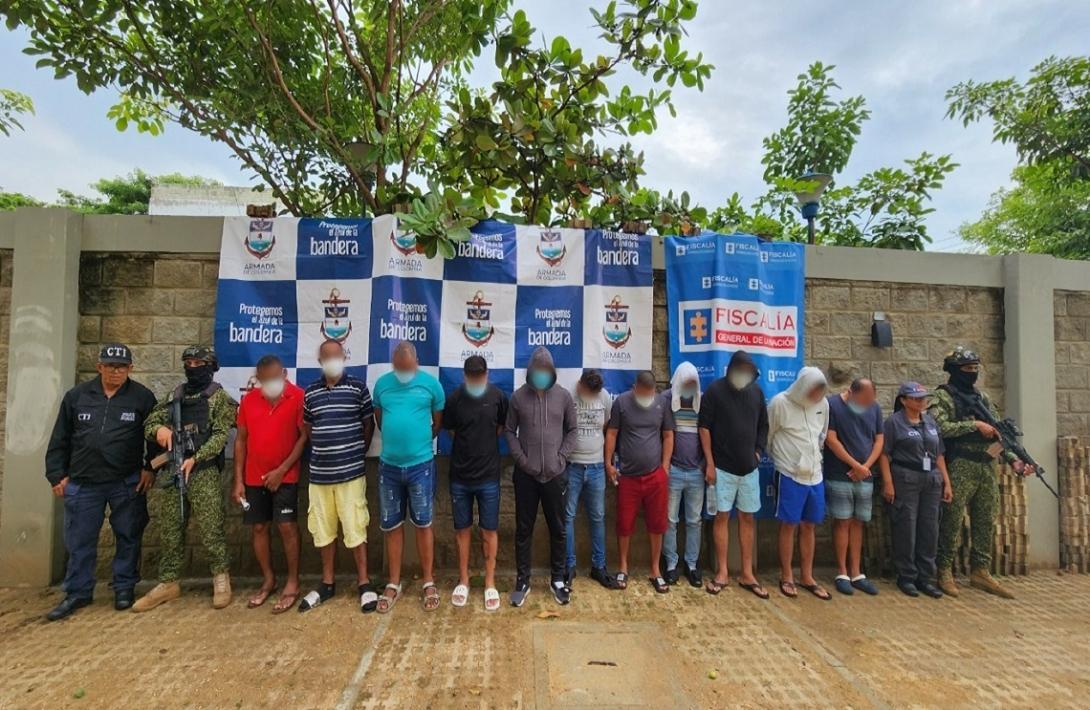In a coordinated work by the Colombian Navy, the Attorney General's Office through the Specialized Directorate against Drug Trafficking, the Technical Investigation Corps – CTI, and the Anti–Narcotics Directorate of the National Police, it was possible the arrest of 15 individuals allegedly responsible for a drug trafficking network, during the development of coordinated operations that were carried out simultaneously in Cartagena – Bolívar and Riohacha - La Guajira.
These men apparently obtained the cocaine in laboratories located in Nariño, Cauca and Magdalena. Later they transported it to Cartagena from where they coordinated the departure of the drug inside containers that were destined for the ports of Spain, the United States, France, Guatemala, the United Kingdom, the Dominican Republic, and Caribbean countries.
Within the framework of an important investigative and operational result, it was possible to show that this drug trafficking structure used the modality of concealment of narcotics in cargo containers, while these were in parking lots and warehouses of legal companies that were given for that purpose. In the same way, it was discovered that these individuals mixed the narcotic with legal merchandise, and thus, try to avoid the profiling of the containers in the ports.
Criminal method
One of those arrested in the inter-institutional operation Octopus, is alias La R or Rubio, a retired officer of the National Police, who would be the maximum leader of this transnational network. This man is accused of taking advantage of his experience as a profiler in the main ports of the Colombian Caribbean to enter the illicit substance in parcels and contaminate the containers.
The others arrested are alias Fresa, one of the alleged financiers, alias Afra, alias Barbas, alias Bodeguero, alias El Papi, alias Ferna, alias Gafitas, alias Jorge, alias Mañé and alias Precintos, who would be involved in the collection, camouflage and logistics. On the other hand, there are alias Mantilla and alias Ramírez, former members of the National Police, as well as alias Naranjo and alias Satelital, who were responsible for the selection of cargoes and vessels to pollute.
These 15 people will be presented to the competent authorities for the judicial process by the Attorney General's Office, where they will be charged with the crimes of trafficking, manufacture or carrying of narcotics aggravated and association to commit crimes.
“We are here in Cartagena with the National Navy and we want to tell Colombians that by uniting our operational and investigative resources put definitively an end to a criminal network accused of moving tons of cocaine in containers, which left the Caribbean to international destinations, we have achieved a great result that leads to tell Colombians that these actions generate security, generate tranquility to citizens,” said the Attorney General of the Nation, Francisco Barbosa Delgado.
Mr. Vice Admiral Orlando Grisales Franceschi, Chief of Naval Staff of Operations of the Colombian Navy highlighted:
“The National Navy through the inter-institutional operation Octopus, have hit several of the facets or the value chain of this structure, among those arrested are those in charge of contaminating the containers, in charge of modifying the security seals of the containers, and the structure in charge of contaminating vessels with narcotics
The operations carried out by the National Navy have served to collect the necessary evidence to carry out the so effective judicial process by the Attorney General's Office.
As of today in interception operations, the Navy has confiscated more than 250 tons this year, exceeding the goals established the previous year.
For the current administration from August 07 to date, we have found 50 tons of cocaine hydrochloride at sea, this is the contribution and result of the inter-institutional operational synergy, the efficiency of the State to hit these structures.
Source: Press, National Navy of Colombia





